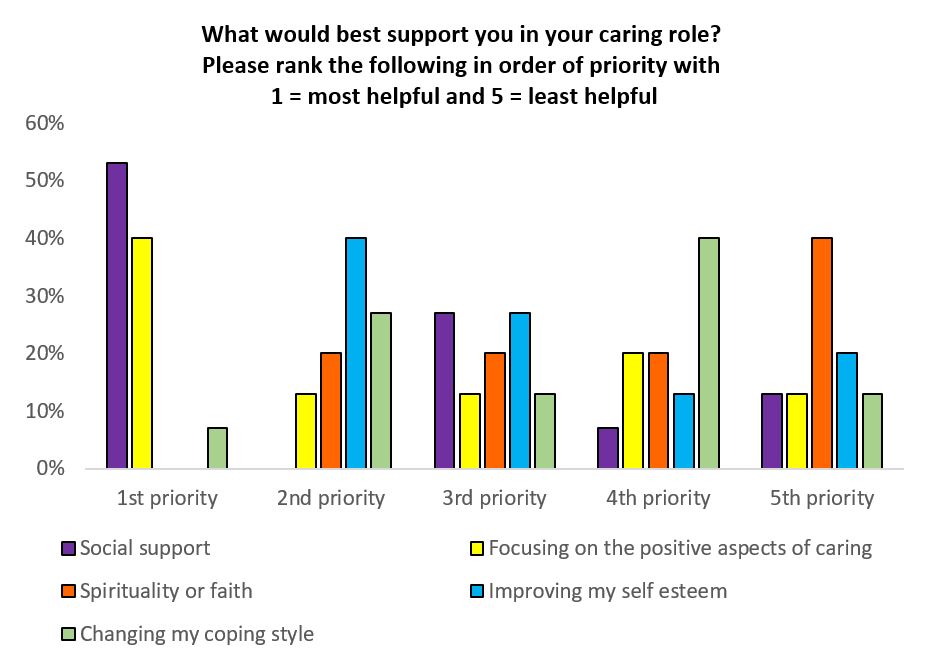March 26, 2021
By Diane Fox and Mandy Rudczenko
Since the first coronavirus lockdown in March 2020, many of the usual services for ill, frail or disabled people have been disrupted or delivered differently, meaning family members, partners or friends (unpaid carers) have provided more support than ever. The number of carers in the UK providing unpaid support to family, friends or neighbours is estimated to have grown by 50% to 13.6 million[i]. Besides, 81% of carers already providing care before the pandemic, report an increase in the number of hours they spend caring each week[ii], so it is more important than ever to provide adequate and appropriate support for carers.
Increases in the intensity of caring can come at an individual cost to carers, in terms of their time, finances[iii], health[iv] and quality of life[v], and has broader impacts on the health and social care system. For example, since March 2020, there has been a 64% increase in requests for social care services because unpaid carers are unable to continue caring or have become ill themselves[vi].

Researchers from the University of Kent’s Personal Social Services Research Unit (PSSRU) and the London School of Hygiene and Tropical Medicine, are conducting a research study funded by the National Institute for Health Research’s (NIHR) School for Social Care called the Diverse Experiences of unpaid Care Across Time (DECAT). The study will examine how and why carers’ quality of life changes over time. Having a better understanding of carers’ experiences over time will help to tailor and target support for carers.
Knowledge exchange
The DECAT research team held a series of online knowledge exchange workshops with carers and staff from local authorities and carer support organisations. The information generated at the workshops will contribute to the topics covered in the questionnaire and interviews used in the DECAT study.
Public engagement
The carers workshops were advertised via the National Institute for Health Research (NIHR), on online platforms and via the networks of the DECAT project’s advisory group members. Advertising far and wide, using both national and local networks yielded a diverse group of carers from almost every region in England.
Workshop attendees spoke about their varied experiences of caring, identified the key issues for them (both pre and post COVID-19) and discussed what helps them in their caring role. It’s important to hear directly from unpaid carers and staff from organisations supporting them, what their priorities are, particularly given the rapidly changing context due to the COVID-19 pandemic. One of the attendees, Mandy Rudczenko tells us what it was like to take part (see Box 1).
Attendees highlighted several issues present prior to the COVID-19 outbreak that have been exacerbated by restrictions, for example, increases in caring responsibilities and greater difficulty accessing health and social care services.
The COVID-specific issues discussed were:
- Restricted visiting of relatives (in care homes or their own homes).
- Decreased time for themselves.
- Reduced social support, resulting in increased social isolation.
Attendees reported drawing on a number of resources to support them in their caring role such as, support from other family members, faith-based organisations or community groups and getting comfort and companionship from pets.
Wider impact
In a post-workshop survey, attendees were presented a list of topics, identified from previous research, as related to carer’s quality of life. Carers ranked them in order of priority (see figure below as an example). Exercises like these ensure research is relevant to carers and the staff supporting them.

The carers attending the workshops voted social support as most helpful in supporting them with caring, followed by focusing on the positive aspects of caring and improving their self-esteem. Involving carers to shape research offers them an opportunity for their experiences and opinions to be heard, something often lacking with the focus of care professionals on the ‘cared for’ person. Furthermore, the workshop feedback also revealed that the group discussions enabled carers to learn from each other through peer-support, as summed up by another workshop attendee.
“You (the researchers) were very wonderful in the style and respect you offered to everyone at the workshop, giving us all the time and respect to open up on our experiences. On my part, it was really very helpful and useful to hear from others on what challenges they were experiencing in their lives.”
Male workshop attendee
The public engagement events held as part of the DECAT research project so far, highlight the mutually beneficial impacts for researchers and carers. More events for the project will be held later this year, because as Mandy said earlier, what’s not to like?
Disclaimer
This blog reports independent research funded by the National Institute for Health Research School for Social Care Research. The views expressed in this publication are those of the author and not necessarily those of the NIHR SSCR, the National Institute for Health Research or the Department of Health and Social Care
[i] Carers Week (2020) Research Report.
[ii] Carers UK (Oct 2020) Caring Behind Closed Doors: six months on
[iii] Ruiz-Adame Reina,M., Correa, M. & Burton, K. (2019) The opportunity costs of caring for people with dementia in Southern Spain. Geceta Sanitaria, 33, 1, pp.17-23.
[iv] Ashford, R, & Hill, S. (2020) Health Survey for England 2019: Providing care for family and friends.
[v] NHS Digital (2019) Personal Social Services Survey of Adult Carers in England 2018-19.
[vi] Association of Directors of Adult Social Care (2020) ADASS Autumn Survey 2020